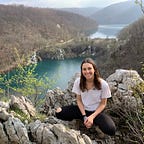Clean Streets Santa Monica Community Organizing
Trash on the streets is much more than an eyesore. It finds its way into the ocean and into the food web, harming us and the planet. Let’s do something about it.
The last big social gathering I participated in before quarantine was a screening of The Story of Plastic, a documentary that illuminates the social justice and environmental issues plastic creates throughout its lifecycle of extraction to disposal. The film and panel had a big impact on me, and led me to borrow the audiobook Plastic Ocean from the library app at the start of quarantine. That book, with its details of the human health effects of microplastics and so much more, kicked me into action*.
I developed a quarantine hobby of picking up trash in my neighborhood, Sunset Park. I’d reuse plastic bags of various sizes- one as a glove and one to hold the trash… a sheet of Amazon bubble wrap could turn into about 10 makeshift gloves!- and went on walks almost every day, sometimes multiple times a day. I found that it was a great way to get outside and think, and I got to know my neighborhood and its litter on a whole new level. Sometimes I’d get overwhelmed by never-ending-ness of the task, but if you take the same route home that you took on your cleaning route, then you get rewarded with a beautiful nature walk on the way back!
In time, I started to notice trends and patterns, like the huge influx of gloves, masks, and takeout containers lining the streets, or certain trash bins that tended to overflow and get windswept, or items that were particularly problematic for people to put in the wrong bin, like lightweight plastic bags and wrap in the recycling bin because they blow away (and are not recyclable).
When I worked for Mayor Garcetti’s office, one of our major projects was called Clean Streets LA. The sanitation department installed cameras on all of its trucks and set up an elaborate data gathering system to mark the cleanliness of every street in LA with a score of 1, 2, or 3, based on criteria like the presence bulky items or loose litter. The effort has been quite successful, in tandem with other initiatives like adding 5,000 new trash cans across the city and improving the 311 system to report bulky items or illegal dumping.
Drawing from that experience, I am thinking about organizing something similar for Santa Monica more on a community level. So, like with Clean Streets LA, I started with a map. The pins represent particular hotspots I have noticed, and I overlaid the city zoning map out of curiosity.
Here is what I am looking to achieve by putting all these thoughts out there:
- I only really know and can take some responsibility for my immediate neighborhood, where the pins are currently clustered. I/we need help with the even more important streets close to the coast.
- I’d like to get connected with like-minded people and organizations, like LA WaterKeepers, or especially SM City and Sanitation Department. As a small example, I once saw a sticker on a recycling bin that said “Please Flatten Boxes.” I’d love to get some of those! Flattening boxes is such a simple fix that makes a huge difference because bulky boxes keep the lid of the recycling bin open and papers, etc fly out.
- Ultimately, this journey is teaching me more about the need for and fairness of what I’ve heard called “Extended Producer Responsibility.” For instance, where there is a fast-food restaurant or coffee shop, invariably there is litter (looking at you, Burger King and Yum Yum Donuts on Pico). Every employee in those companies needs to take some responsibility — from the cashiers who could ask if you need plastic utensils to the executives who could offer incentives for reusable containers. Figuring out EPR or something like it will require a lot of collective thought.
In many ways, Coronavirus has taken us backwards when it comes to waste even as there have been silver linings in regards to emissions and people having the time to step back and reflect. Waste is such an important, multi-faceted issue, and I look forward to connecting with people similarly drawn to it.
*I am currently being kicked into writing this post by The Future We Choose. Yay inspirational books!
